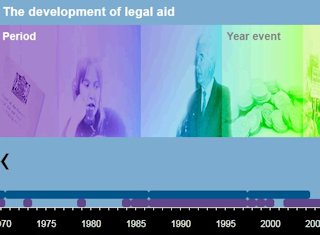2 The development of legal aid
The Legal Aid and Advice Act 1949 was the birth of the modern-day legal aid scheme. It followed the recommendations of the Rushcliffe Committee which reported to Parliament in 1945.
Box 2 The Rushcliffe Report
The Rushcliffe Report recommended that:
- Legal aid should be available in all courts and in such a manner as will enable persons in need to have access to the professional help they require.
- This provision should not be limited to those who are normally classed as poor but should include a wider income group.
- Those who cannot afford to pay anything for legal aid should receive this free of cost.
- There should be a scale of contributions for those who can pay something towards costs.
- The costs of the scheme should be borne by the state, but the scheme should not be administered either as a department of state or by local authorities.
- The legal profession should be responsible for the administration of the scheme.
- Barristers and solicitors should receive adequate remuneration for their services.
At the start of the scheme, legal aid was mainly used in criminal and divorce cases, but in the 1970s that changed when law centres began to open. They identified the need for legal aid in housing and employment cases. The first law centre was opened on 17 July 1970 in North Kensington, London.
During the 1980s and 1990s the cost of legal aid increased exponentially and by 1995–1996 the total cost was £1.4 billion. Significant changes were made to the availability of legal aid and in 2006 Lord Carter’s review of legal aid procurement made a number of recommendations for future changes (Carter, 2006). Lord Carter suggested a new competitive system in England and Wales with a focus on price. Further cuts to legal aid and the introduction of additional bureaucracy were made as a result of the report.
The most significant change to legal aid came with the Legal Aid, Sentencing and Punishment of Offenders Act 2012 (LASPO 2012) which came into effect on 1 April 2013. The Act created the Legal Aid Agency (LAA) which now administers legal aid. Only organisations which have a contract with the LAA can provide legal aid services.
Box 3 The right to choose a lawyer under legal aid
Ian Brady was jailed in 1966 for three murders and was held at Ashworth Hospital. He was seeking permission for judicial review to challenge the refusal to allow him the lawyer of his choice to represent him before the Mental Health Review Tribunal (MHRT). His solicitor, Robin Makin from E. Rex Makin & Co, had represented him for 25 years but did not have a legal aid contract in the mental health category and so was not entitled to act for him in the MHRT. Brady’s legal team was arguing that the Lord Chancellor, Liz Truss (at the time of writing: October 2017), had the power to intervene to ensure he was represented by a lawyer of his choice but she refused to do so on the grounds it would not be a ‘lawful and proper use of her power.’ Judgment was given on 20 February 2017, Justice Morris dismissed the application as ‘unarguable’ and ruled ‘it had no realistic prospect of success’. At paragraph 90, the Judge said ‘neither the provisions of the ECHR themselves, nor any case law authority, supports the proposition that in civil proceedings, and in particular in proceedings relating to detention on grounds of mental health, there is a right to publicly funded representation for a lawyer of choice.’ Brady’s team were considering an appeal to the Court of Appeal but Ian Brady died on 16 May 2017. This is a very unique case but it preserves the position that there is no right to free representation by a lawyer of choice in civil matters. If you want to find out the position in criminal proceedings read paragraphs 29 to 30 of the judgment in Croissant v Germany (1993) 16 EHRR 135.
LASPO 2012 took out of scope a significant number of types of cases for legal aid funding, including housing, welfare, debt, immigration, employment and clinical negligence. The impact, particularly on civil legal aid, has been dramatic. The justification for the sweeping cuts to legal aid was the prevailing economic conditions and the requirement to introduce austerity measures. Some commentators have argued that the cuts were ideological and that changes breach international rights. The recommendations of the Rushcliffe Committee no longer feature as part of the current legal aid system. Human rights organisations, such as Liberty, argue that an adequately funded legal aid system is a human right and access to justice is critical to the rule of law and democracy.

